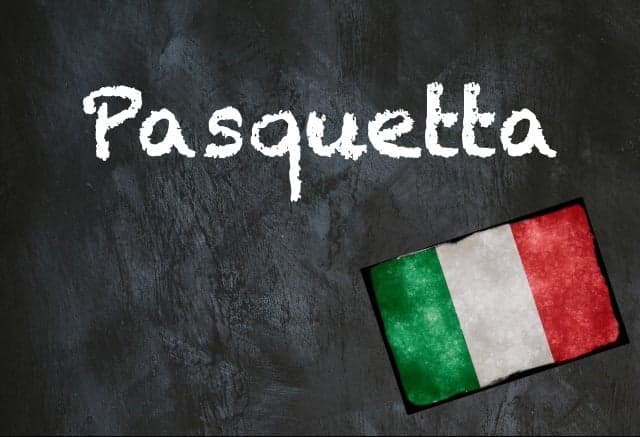Italian word of the day: 'Pasquetta'

Happy 'little Easter'!
In Italy, Easter Monday is known as Pasquetta, literally 'little Easter'.
You might hear some Catholics refer to it as il Lunedì dell'Angelo ('Angel Monday'), in reference to the story the Gospels tell of an angel appearing to women gathered at Jesus's grave and telling them He had risen.
READ ALSO: Why is Good Friday not a holiday in Italy?
While it has less religious significance than Good Friday (il Venerdì santo) or Easter Sunday (la Domenica di Pasqua or simply Pasqua), unlike either of those holidays, Easter Monday earns Italians a day off.
Monday is Italy's one public holiday over Easter, and with no particular religious ceremonies to attend, it's typical for Italians to take a day trip to the countryside and enjoy the spring weather.
Cosa farete di bello a Pasquetta?
Got anything nice planned for Easter Monday?
Easter Monday also goes by another name: il Lunedi dell'Agnello or 'Lamb Monday', which gives a clue to the other highlight of the day – the lunch, which traditionally stars lamb.
Romans typically prepare lamb soup or cook it in an egg and citrus sauce, southern Italians often put it in a stew, while elsewhere it will be roasted with garlic and rosemary – every family and restaurant has its own special recipe.
If you don't eat animals – or at least, not the cute ones – Italy has a veggie option in the form of a cake baked in the shape of a sheep, which you can find in many bakeries at this time of year.

See our complete Word of the Day archive here.
Do you have a favourite Italian word you'd like us to feature? If so, please email us with your suggestion.
Comments
See Also
In Italy, Easter Monday is known as Pasquetta, literally 'little Easter'.
You might hear some Catholics refer to it as il Lunedì dell'Angelo ('Angel Monday'), in reference to the story the Gospels tell of an angel appearing to women gathered at Jesus's grave and telling them He had risen.
READ ALSO: Why is Good Friday not a holiday in Italy?
While it has less religious significance than Good Friday (il Venerdì santo) or Easter Sunday (la Domenica di Pasqua or simply Pasqua), unlike either of those holidays, Easter Monday earns Italians a day off.
Monday is Italy's one public holiday over Easter, and with no particular religious ceremonies to attend, it's typical for Italians to take a day trip to the countryside and enjoy the spring weather.
Cosa farete di bello a Pasquetta?
Got anything nice planned for Easter Monday?
Easter Monday also goes by another name: il Lunedi dell'Agnello or 'Lamb Monday', which gives a clue to the other highlight of the day – the lunch, which traditionally stars lamb.
Romans typically prepare lamb soup or cook it in an egg and citrus sauce, southern Italians often put it in a stew, while elsewhere it will be roasted with garlic and rosemary – every family and restaurant has its own special recipe.
If you don't eat animals – or at least, not the cute ones – Italy has a veggie option in the form of a cake baked in the shape of a sheep, which you can find in many bakeries at this time of year.

See our complete Word of the Day archive here.
Do you have a favourite Italian word you'd like us to feature? If so, please email us with your suggestion.

Join the conversation in our comments section below. Share your own views and experience and if you have a question or suggestion for our journalists then email us at [email protected].
Please keep comments civil, constructive and on topic – and make sure to read our terms of use before getting involved.
Please log in here to leave a comment.